Written by Arctotherium.
Progress Studies is a combination of academic discipline and political movement aiming to study “the causes of civilizational progress”, i.e., the “economic, technological, scientific, and cultural advancements that have transformed human life and raised standards of living over the past couple of centuries”. Those under its banner (such as Tyler Cowen and Jason Crawford) tend towards technophilia, libertarianism and rationalism, with a view towards continuing the incredible progress seen between roughly 1760 and the present—especially in light of the Great Stagnation, the clear slowdown in progress since 1973 (in the wealthiest and most dynamic parts of the world).
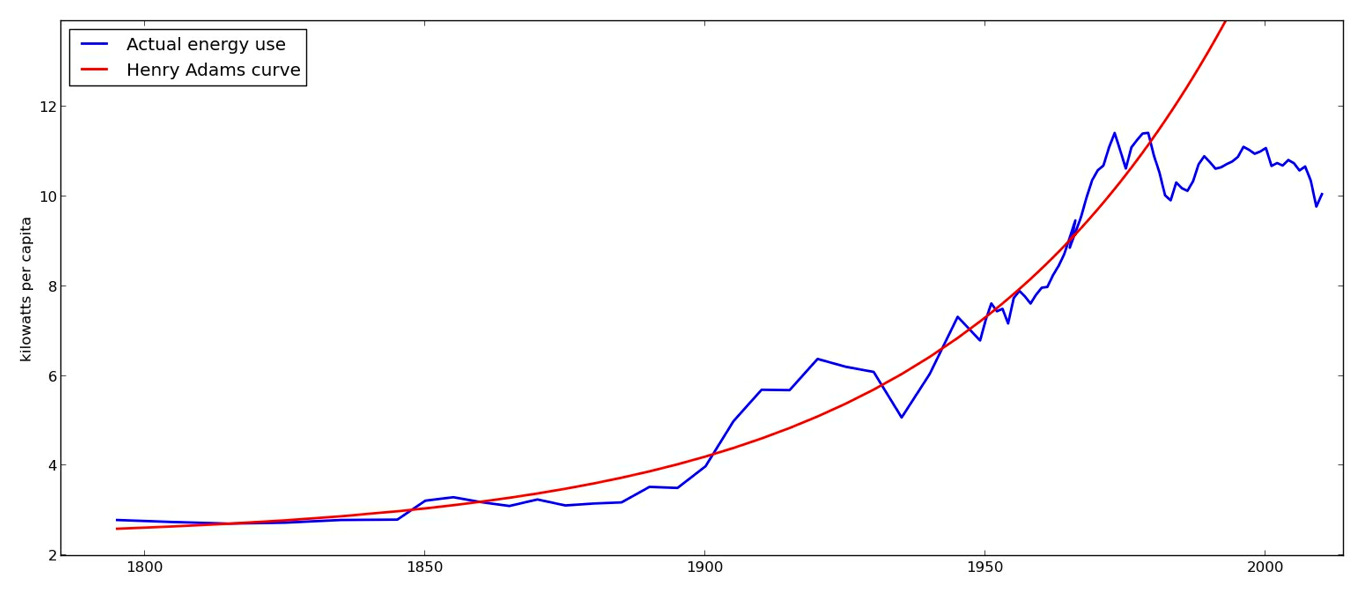
That date matters. The decade between 1963 and 1973 in the United States saw the triumph of the New Left. Civil Rights, affirmative action, mass non-white immigration, second wave feminism1, the expansion of welfare and pensions, the environmental movement, and the rise of the regulatory state all had their start over the course of a few years. The decade was capped off by the 1973 oil crisis, which symbolically brought the post-WWII economic and demographic boom years to a close.
Progress Studies, in seeking to return to the pre-1973 trend, focuses on rolling back parts of the regulatory state, but that’s not the only thing that matters.
Culture is becoming anti-progress
Progress Studies is not solely concerned with objective material indicators of slowdown. Culture matters too. In his 2021 essay, ‘We need a new philosophy of progress’, Jason Crawford wrote:
We live in an age that has lost its optimism. Polls show that people think the world is getting worse, not better. Children fear dying from environmental catastrophe before they reach old age. Technologists are as likely to be told that they are ruining society as that they are bettering it.
He is right. This change is quantifiable. Books written in English, French and German, the three major languages of the modern West, showed a continuous rise in the number of terms relating to progress and the future from 1600 to around 1970, when things suddenly took a turn for the worse.
One of the biggest drivers of progress is rationality. Progress depends on the belief that the world is rational to begin with and can be understood and therefore intentionally changed for the better. (Anton Howes, the historian behind Age of Invention, calls this the “improver’s mentality” and observes that it is historically rare, only arising in a handful of cultures). This is not an intuitive belief! Muslim scholar Al-Ghazali famously argued that, as everything occurs the way Allah wills it rather than according to predictable laws, science was impossible. The “idea of progress,” that sustained improvement is both possible and desirable, is a fleeting one.
Even more importantly, reason allows people to stand on the shoulders of giants. Scientific and technological progress are driven by exceptional individuals, but reason makes it possible to reliably build on past findings or to debunk them when they’re wrong, which allows the collective brain to improve over time—rather than running in circles.2
With that in mind, the English corpus shows a steady rise in reason-related words and a corresponding fall in intuition-related words from 1850 to 1975, when this trend suddenly and sharply reversed.
The same trend appears in US Congress:
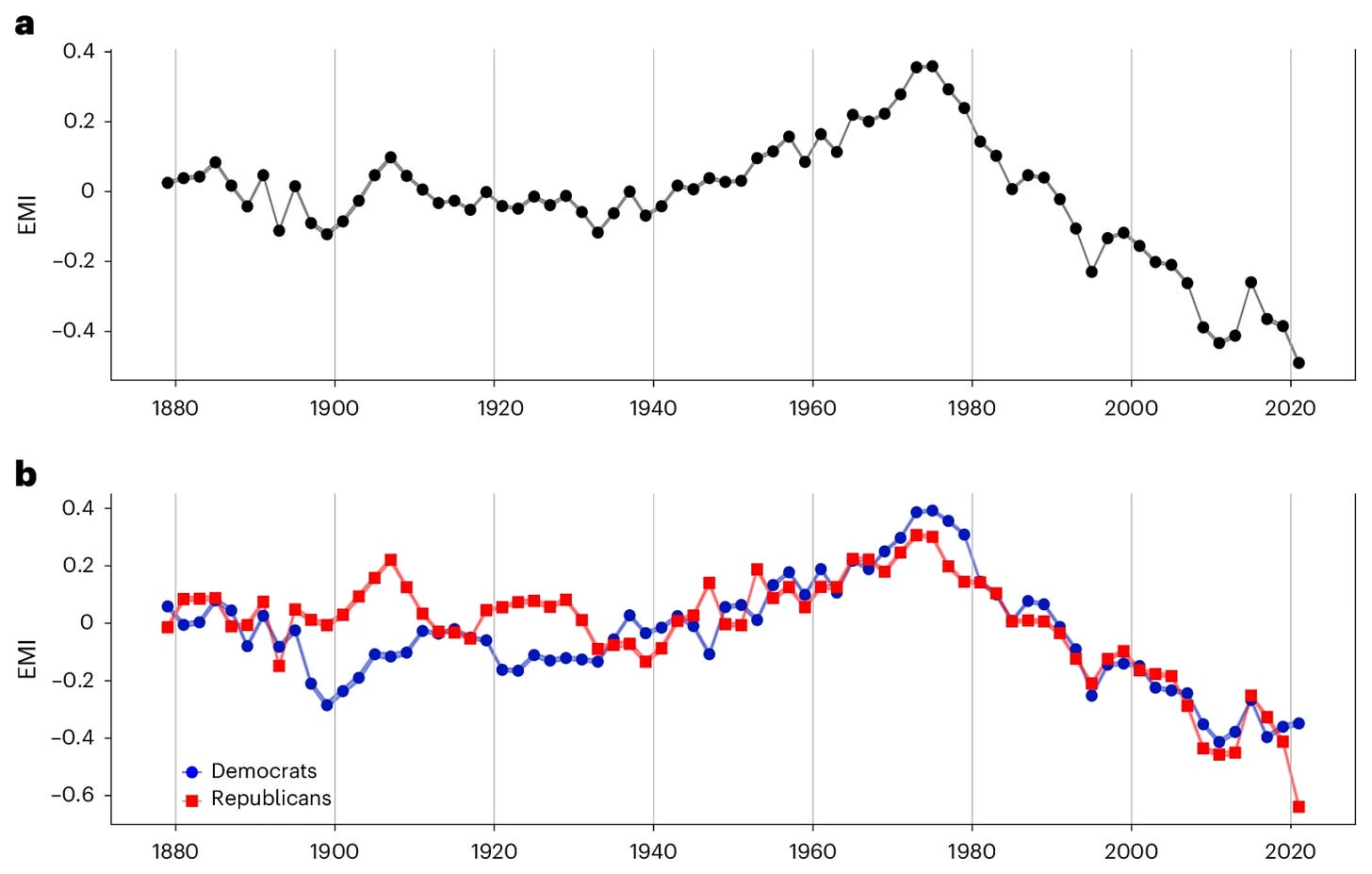
In all of these datasets, we see the same turning point at the same time—within a few years of 1970. The Spanish situation is similar, but as with the Second Demographic Transition, slightly delayed. This timing and delay is very similar to those of the Second Demographic Transition, which suggests the cause may be similar. Is this plausible?
The big political sex difference: progress
“I’ve been thinking about “progress” in the sense of Progress Studies lately, as I’m wrapping up the fellowship and leading into the conference. A common lament is that the “progress community” is very masculine — both in the sense that women are underrepresented among enthusiasts of markets and technology, and perhaps also in the sense that there may be something inherently “masculine” in the gung-ho, relentless, aggressive vibe of “progress” as a concept itself”
—Sarah Constantin
Despite a widening gap in political identification, sex differences on specific political issues are typically small. But there’s one3 enormous area where that isn’t true: support for technological progress, economic dynamism and human abundance.
For example, the ur-symbol of progress in the second half of the 20th century was space exploration. For as far back as there is data, men have been much more likely to support increasing government funding for space exploration, usually around twice as much.
Perhaps the single biggest political issue taken up by those under the banner of Progress Studies is housing. Political barriers to local construction (NIMBYism), especially in highly-desirable metropolitan areas, are blamed4 for low supply and thus extremely high housing prices, which are in turn blamed for “slow growth, climate change, poor health, financial instability, economic inequality, and falling fertility.” In Britain, which has one of the worst housing crises in the developed world, men support building more houses in their local area by 17 points. Women oppose doing so by 3.
Nuclear power, which combines insignificant greenhouse gas emissions and air pollution with the reliability of fossil fuels, is another technology the progress movement strongly backs as a supplement to solar. There is a 30—point sex gap in support for increasing nuclear power generation in the US, and being male is one of the strongest predictors of support for nuclear in Denmark.
As you would expect from their technophilia, Progress Studies is broadly in favor of transgenic crops (GMOs), such as golden rice or roundup-resistant corn, given their potential to continue rapid 20th century progress in agriculture. GMOs don’t get as much attention as they used to, but women are 16 points more likely to believe they are worse for health than men.
Progress Studies is pronatalist, on the grounds that the purpose of progress is to benefit people (there need to be people to benefit), and that more people means more agglomeration effects, more economies of scale, longer learning curves, more opportunities for specialization, more competition and more potential innovators.5 Once again, women are more likely to believe too many children are being born than men (26 to 19) and are less likely to believe not enough children are being born (14 to 30).

Unlike sex differences on issues like abortion or religious attendance, these gaps go back as far as can be measured.
Relevant sex differences in personality
“All that is solid melts into air, all that is holy is profaned.”
Technological and scientific progress is intrinsically dangerous, frightening and destabilizing. It’s also a potential cornucopia of riches. Should the risk or reward dominate? The greater reproductive variance of men means that men are much more likely to accept a high-risk, high-reward course of action. One way of looking at this: the most reproductively successful man of the second millennium was Genghis Khan. The most reproductively successful woman was his mother. Naively, we would expect men to be much more willing to risk failure for an uncertain future payoff, and this is exactly what we see.
Per John Archer’s 2019 meta-analysis of human psychological sex differences, some of the relevant personality differences6 for progress orientation include:
Agreeableness (d = 0.29).
Engineering interests (d = 1.11).
Mechanical reasoning (d = 0.98).
Risk-taking (d = 0.49).
Harm avoidance (d = 0.33).
But there’s reason to believe that personality differences are even bigger because personality is typically assessed via questionnaire. This brings with it some obvious problems, such as people responding with different reference groups7 in mind, as well as social desirability bias, which can deflate results. For example, when assessed via questionnaire, the fearfulness gap between men and women is d = 0.41, which is noticeable but not huge. But when assessed in the real-world, the gap is much larger, d = 1.16.8 A d = 0.49 self-assessed difference in risk-taking might not seem that large, but consider that blank-slatists argue that young women’s social anxiety over cooking a bad meal is equivalent in risk-taking to young men jumping off cliffs for fun. The reference frame for what constitutes a risk is not the same for men and women.
This is why, if you’re looking for people who are both interested and able in engineering, disagreeable enough to break consensus, and willing to take risks for uncertain payoffs, you will overwhelmingly find men. As a result, technology/markets/future and ideas-oriented groups tend to be around 90% male.9

Female cultural dominance
If women are psychologically more predisposed to (small-c) conservativism than men and hence opposed to progress, we might expect female cultural dominance to lead to the pattern seen in the text corpuses above. Does the timing work? Yes. Since 1970, women have gone from present-but-marginal in prestige cultural institutions to approximate parity with men.
First, female-authored books crept upwards a share of the total between 1800 and 1970, before rocketing upwards, and are now a majority. (The publishing industry itself is 74% female.)
Second, academia is intended to be the brain trust of society, an association of professionals paid to discover the truth. In 2022, women became a majority of college faculty in the United States.
Data doesn’t exist for the key year of 1970, but if we plot the ratio instead, we get the following chart.
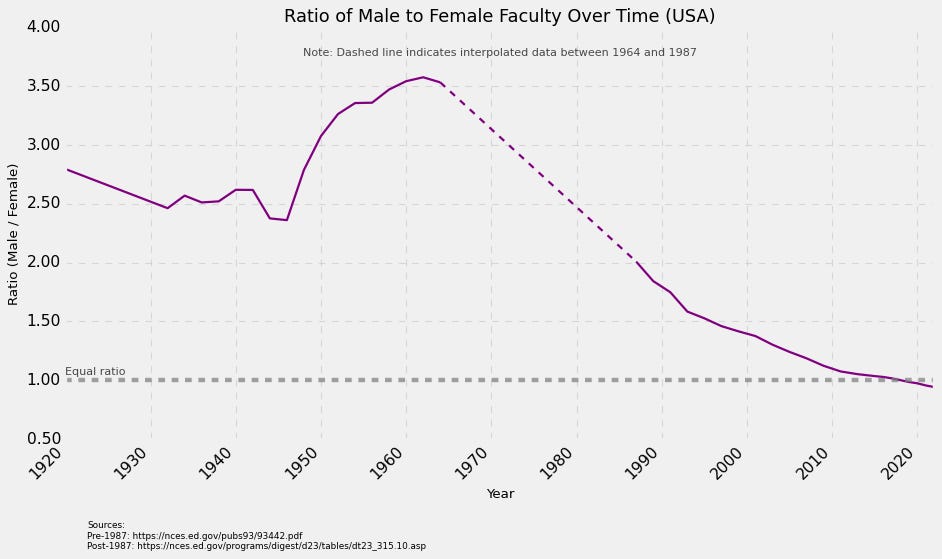
This closely matches the picture for college graduation rates (note that the x-axis is cohort birth year in the chart below).
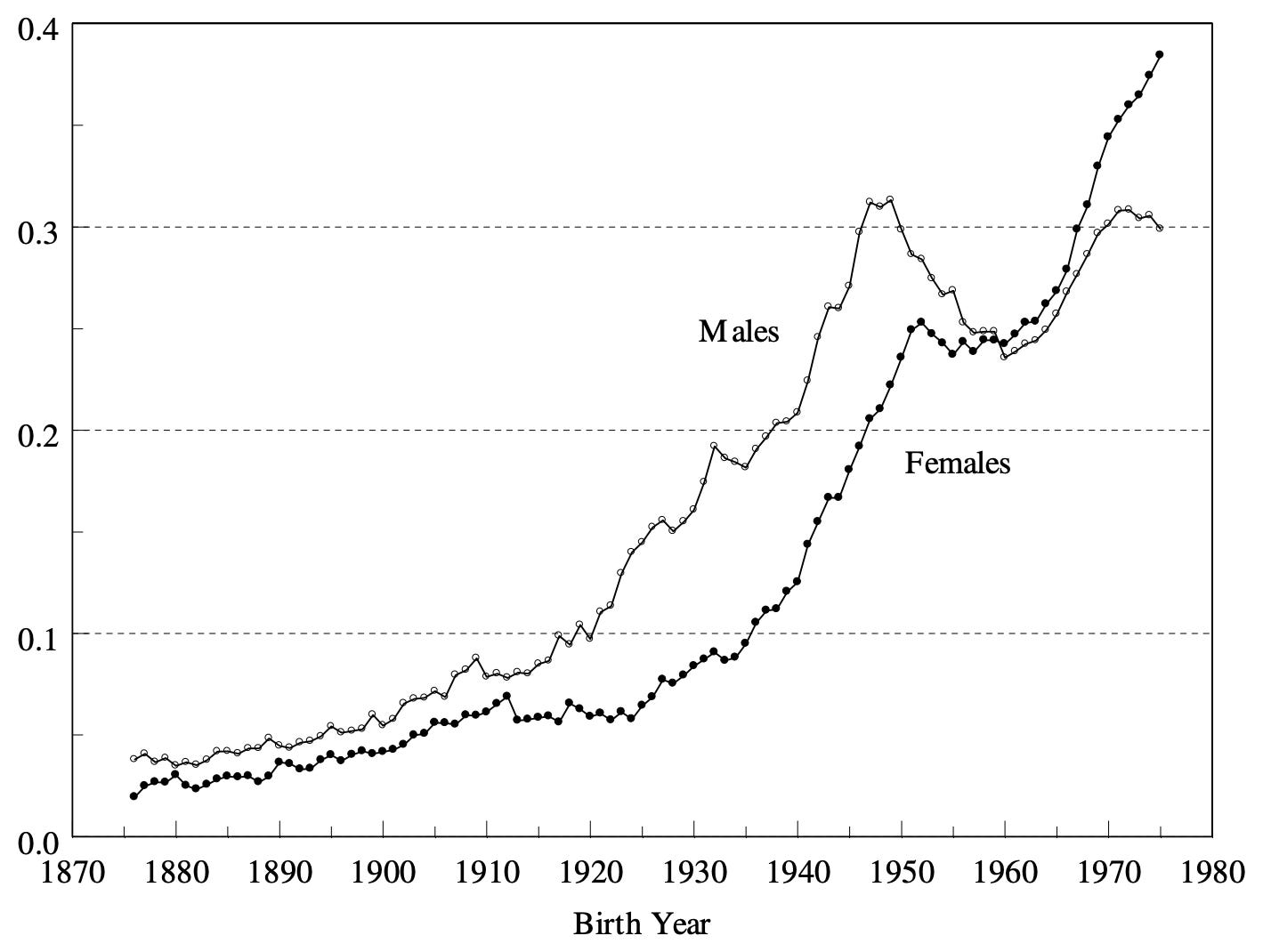
The ratio shows the same pivot corresponding to approximately 1970.
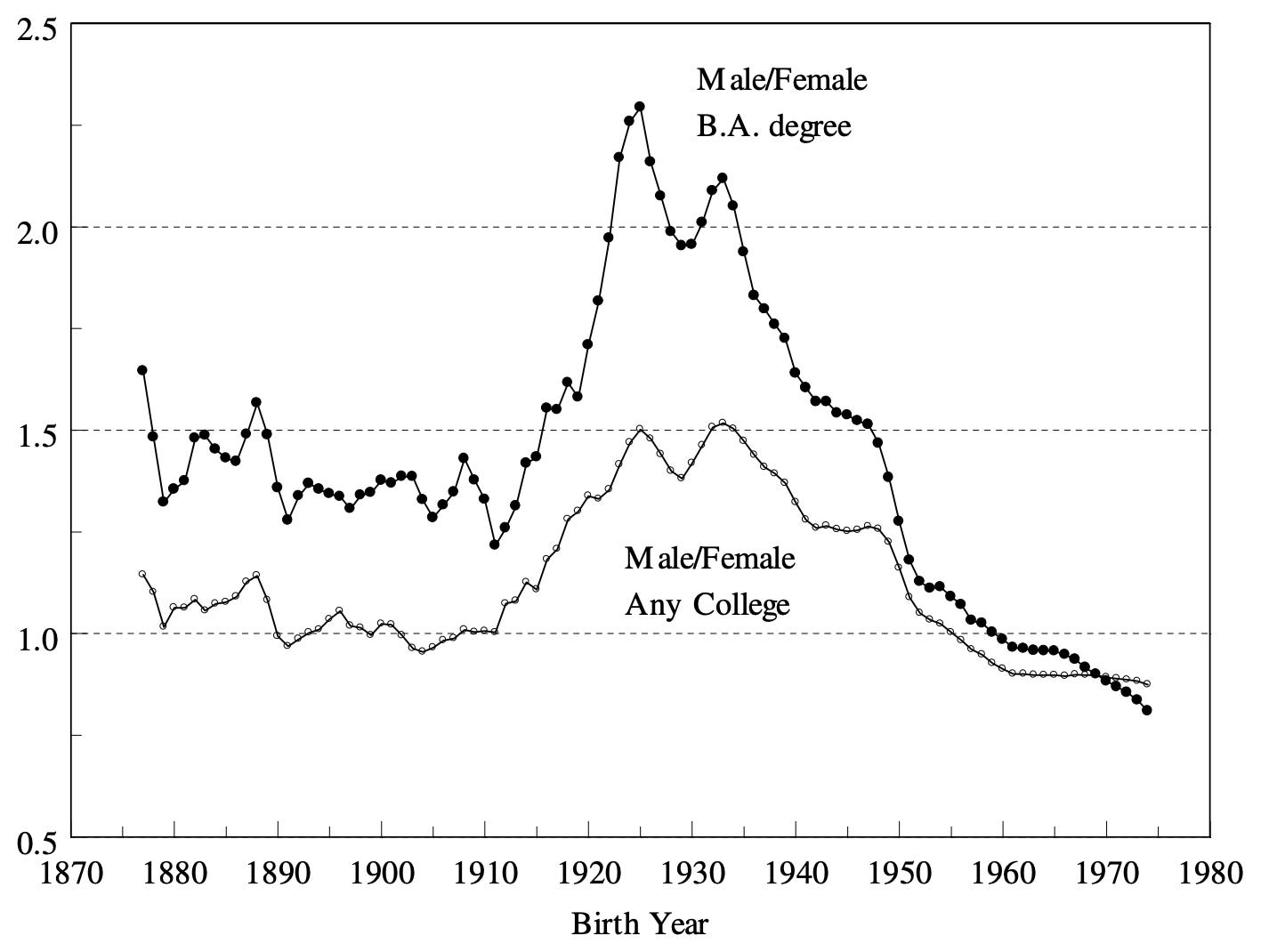
The media can be seen as the nervous system of civilization. It is the institution through which public knowledge is created, and through which threats and opportunities are identified. The female share of journalists approximately doubled between 1971 and 2022.

Lastly, the US Congress, which as we’ve seen follows the broader linguistic trend closely, looks like this:
So the commanding heights of cultural production in the form of authors, academia, the media and the college-educated have all become dramatically more feminine since 1970—and where there is prior data it shows that 1970 was indeed a critical inflection point. This makes sense. 1970 is when second-wave feminism definitively won the battles of ideas, laws and norms.
Conclusions
The biggest political sex difference is in progress orientation, and this comes down to psychological differences between the sexes. If you feminize the culture-forming institutions of society, society will predictably become more anti-progress.
The Great Stagnation began in 1973. Progress Studies wants to undo part of the 1963-73 cultural revolution to end it… but only part of it. Rolling back the worst parts of the regulatory explosion may matter on the margin, but it’s nowhere near enough to bring the West back to the pre-60s trend. The population aging10, between-population dysgenics11, institutional rot12 and cultural malaise (the subject of this article) we face all come back to that same critical decade. The whole thing’s got to go.
A slightly different version of this article was published here.
Arctotherium is an anonymous writer interested in demographics and the future of civilization. You can find more of his writings at his blog Not With A Bang or at his Twitter.
Support Aporia with a paid subscription:
You can also follow us on Twitter.
And consequent fertility collapse, which has its own negative implications for progress.
One of the great mysteries of history is why China, which for much of history was the most technologically advanced and economically sophisticated state on Earth, with more high-IQ individuals than the rest of the world combined, never even came close to the Scientific and Industrial Revolutions. I speculate that the answer lies in the comparatively atheoretical nature of Chinese thought. They did not know the Earth was round until the Jesuits told them in the 16th century (the Greeks figured it out in the Classical era and Eratosthenes even estimated the circumference to within 1% of the true value). The picture for mathematics and philosophy is similar. Chinese history is full of geniuses and polymaths… but without theory, which requires rationality, they could never build on each other’s work or develop world models by debunking each other.
Two if you count legalizing prostitution.
They can overstate things (it’s not a theory of everything), but Progress Studies is right that housing is extremely important. But they’re wrong to focus exclusively on the supply-side. Demand (i.e., immigration) drives the housing cost explosion in the non-US Anglosphere. In the US, a 1% increase in immigration increases local housing prices by about 1%, but this understates the true effects because natives leave the area. Housing, unlike food or iPhones, cannot be transported and is intrinsically limited by land.
This also partly explains the movement’s disastrous support for immigration (another part is that Silicon Valley is full of immigrants, many of whom instinctively side with other prospective immigrants even against their own best interests). I’ve explained why the scale arguments don’t apply to immigration and why the closely-adjacent tech-right should not support increasing skilled immigration.
Effect sizes are given as Cohen’s d, which is the difference in means divided by the pooled standard deviation. You can think of it as the number of (pooled) standard deviations between the averages of the two populations. A Cohen’s d of 0.20 is usually considered “small,” 0.50 “medium, and 0.80 “large,” but these designations are arbitrary. For reference, the gap in homicide between men and women is d = 2.54; the gap in pain tolerance is d = 1.17. For more on effect sizes, see here.
For instance, if asked whether they are “tall” or “short,” people tend to compare themselves to their own sex.
Whenever female soldiers, firefighters or policemen are criticized, it’s usually on physical grounds—these are physically demanding roles and the enormous sex gap in physical strength (d = 3) means that even a minimally selected man will be more capable than approximately any female applicant. This is 100% true, but can divert attention from the fact that the psychological gaps in relevant traits between men and women, created by the same selective differences that produced the physical ones, are also massive. Crudely: men evolved to fight each other in groups, women didn’t.
I assume my audience is sophisticated enough to understand that 90% is not 100%, but I’ll include this disclaimer just in case: it’s only a minority of men who are really interested in these things, and there is a minority of women who are as well. But this second minority is much, much smaller than the first, and this reflects underlying differences in personality in the population at large.
The post-Baby Boom fertility collapse and consequent population aging, which will increase small-c conservatism further because the elderly are risk-averse, are also downstream of second-wave feminism.
Across all of society through Third World immigration, and within important institutions via affirmative action.
This is the regulatory state expansion that Progress Studies concerns itself with.




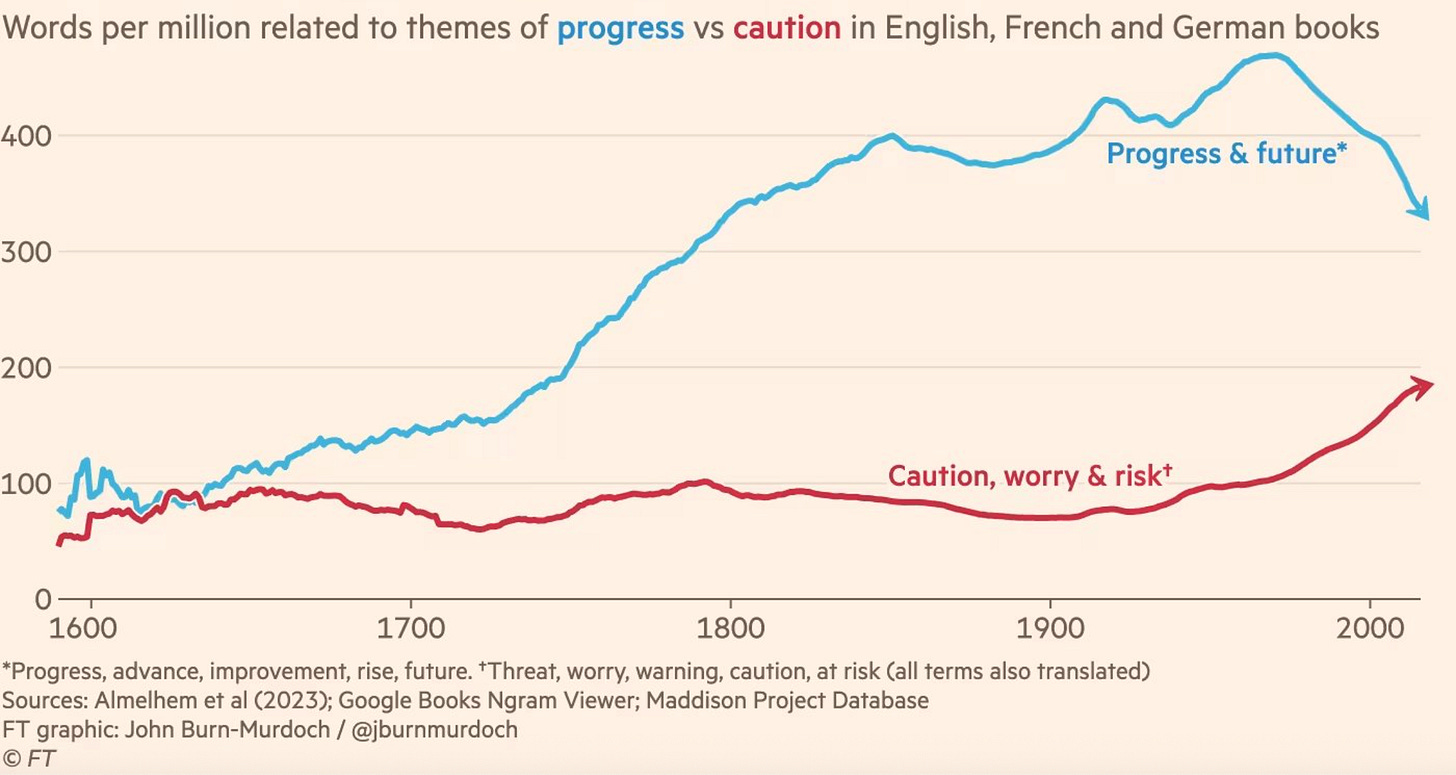

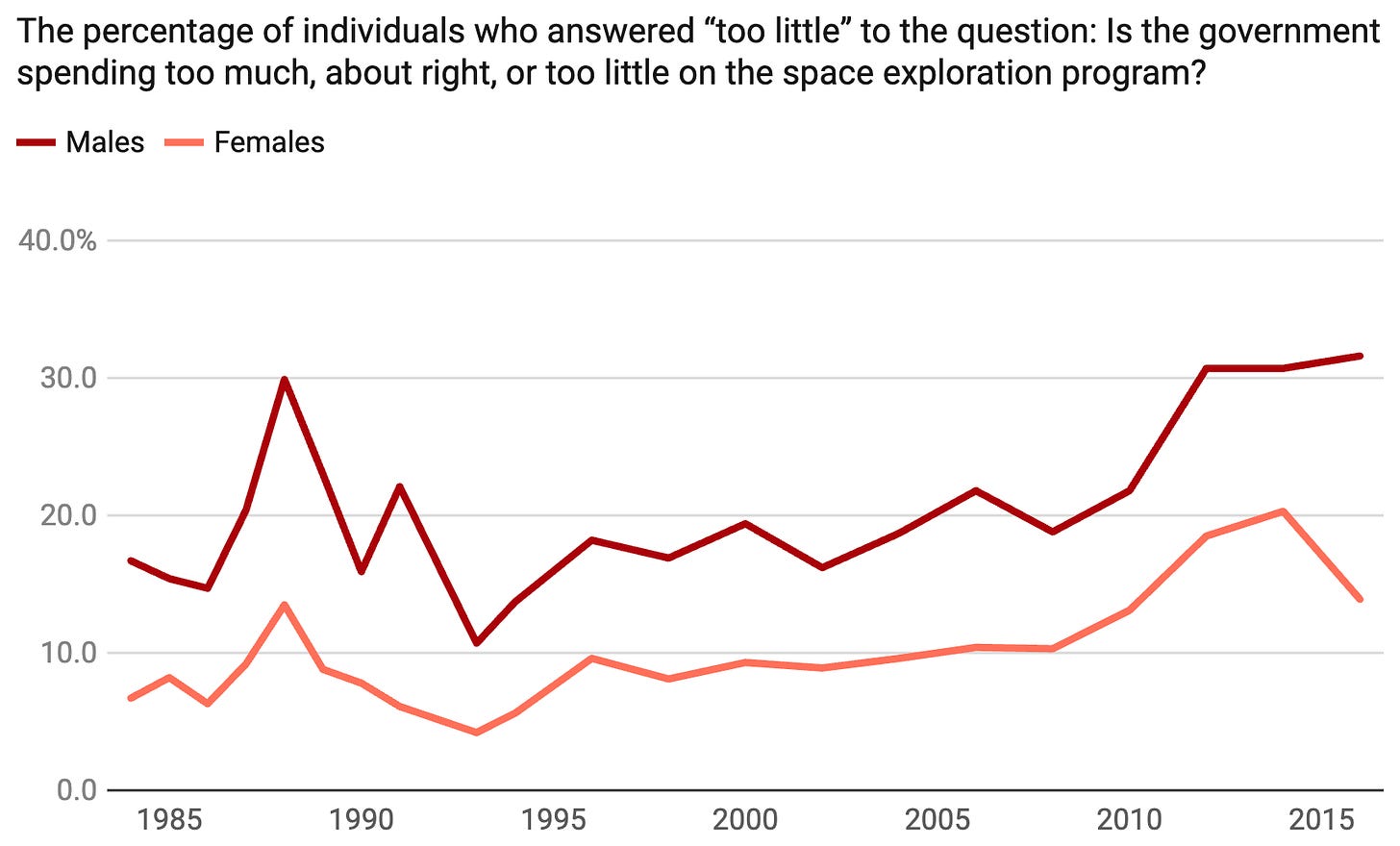
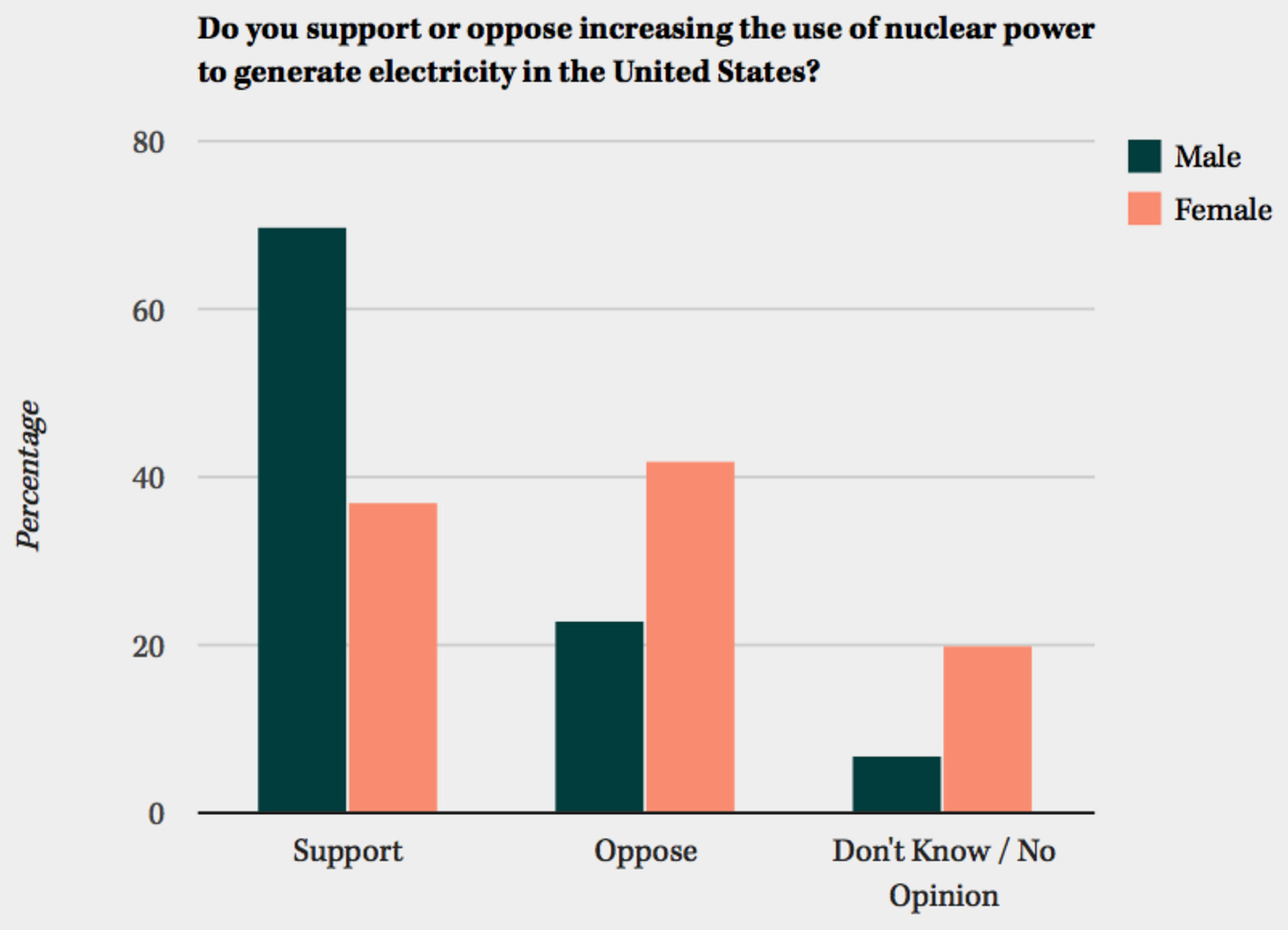

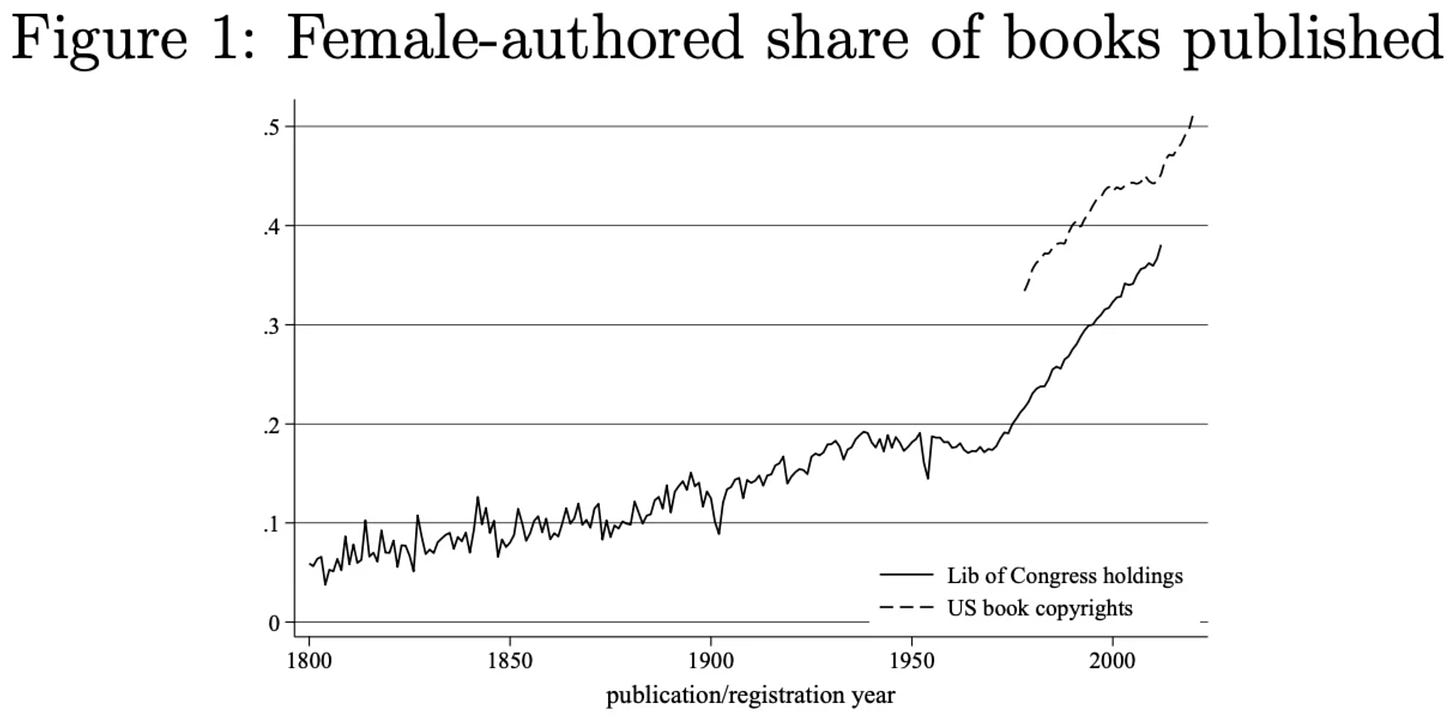



This is a very good article. In general, the author of this article is just very good and always brings joy.
Of course, there is a great irony in what people perceive as "progress" and what it actually is.
A society dominated demographically, culturally, and politically by white men with a capitalist economy and a combination of "economically free neoliberal" and "fascist dirigiste" economic policies (and, according to some studies, a right-wing government- https://x.com/UBERSOY1/status/1929663833997824430 ) it would be the most REALLY progressive - the most productive in terms of technological innovation, real economic growth, etc.it's like the USA of the 1920s or 1950s, or maybe Francoist Spain.
But the average person thinks that "progress" is living in a place like South Africa: lots of "coloreds," decolonization, feminism, immigration, homosexuality, lots of women with tattoos and promiscuous sex, high crime rates, and childlessness and divorce.
Glad to see that the Progress Studies movement is getting some attention with Aporia. As someone who has been researching Progress Studies for 10 years and writing about it for 5 years, I have some knowledge on this topic.
You are absolutely correct in the following:
1) The Progress Studies movement is very concerned about the slowing or stagnation of economic growth since the early 1970s. One thing that I will point out is that the metric you choose really matters as to whether it continued progress, slowing progress, stagnation or decline.
2) The field is absolutely dominated by males. Given the interest in technology, I doubt that will change in the new future. Not many women seem to be interested in the topic, and those that are contribute must less to the research and discussion.
3) There is absolutely a tendency for technophilia, libertarianism and rationalism. I think that you miss the diversity of viewpoints, however. I am a Technorealist, not a technophila, and I wrote why here:
https://frompovertytoprogress.substack.com/p/why-i-am-a-techno-realist
I will point out that the Abundance movement is clearly Center-Left and they are very loosely affiliated with the Progress Studies movement. Many others in the Progress Studies movement appear to be Center-Left as well.
Now to the heart of your argument: I am skeptical of your apparent claim that the cause of slower progress is due to women entering the workforce and the field of ideas in the early 1970s. There are a huge number of cultural, demographic, political, economic and institutional changes that started in the late 1960s and early 1970s. I am skeptical that women entering the workforce was the most consequential.
I believe that far more consequential was the entry of Post-Modern Left-of-Center ideologies into respectability among the college-educated professional class and the gradual expansion of that class over the last 60 years. As Center-Left baby boomers worked their way up the institutional ladder as they aged, they gradually changed the values of the institutions. Then they educated Millenials in their ideology from birth, K-12 and university. Things got really crazy when that generation entered the workforce and got ahold of social media.
These Post-Modern Left-of-Center ideologies were overwhelmingly invented and propagated by men, and more specifically highly educated white men. Having lived through this period, those ideologies were at least as popular among men as women. It is only within the last 10 years that you saw a huge rise in young women supporting Post-Modern Left-of-Center ideologies. Most likely social media played a huge role in this.
So don't blame women for what a small group of men did.
I say more here:
https://frompovertytoprogress.substack.com/p/three-mega-trends-of-the-last-60
I explain more here:
https://frompovertytoprogress.substack.com/p/the-great-realignment-in-american
I think the most important paragraph in this article is “The Great Stagnation began in 1973. Progress Studies wants to undo part of the 1963-73 cultural revolution to end it…. The whole thing’s got to go.”
The last sentence seems to be a critical add-in without really explaining what you mean.
What “whole thing” do you mean? Material Progress + Cultural Revolution has to go. Or the whole Cultural Revolution has to go? And if so, do you really mean going back to Jim Crow segregation?
Very few members of the Progress Studies movement think much about Cultural Revolution, so I disagree that they want "undo part" of it. I am more aware of the cultural destruction that has occurred from the Cultural Revolution, but I would be opposed to rolling back civil rights for blacks and employment for women. I have a hard time seeing how either would contribute to long-term economic growth.
I am willing to debate you, but first I need to know what you actually believe. Do you largely disagree with the article in my first link or disagree?